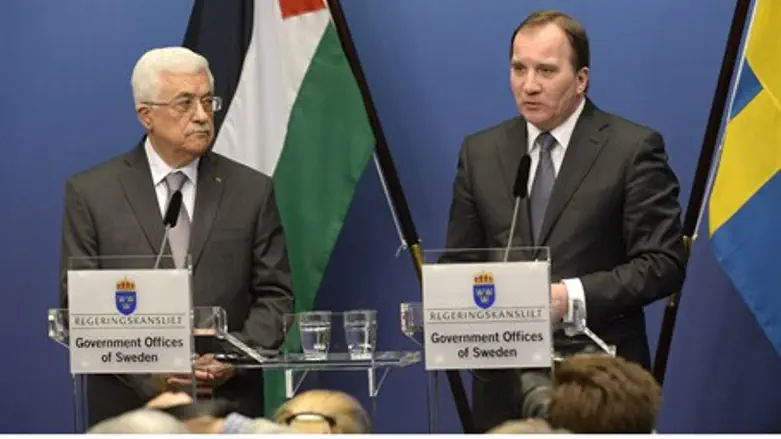
Palestinian Authority Chairman Mahmoud Abbas has described Jordanian and Palestinian Arabs as "one people living in two states," during a meeting with the head of the Jordan Football Association on Tuesday.
Abbas met JFA head Prince Ali Ibn al-Hussein in Amman, to discuss last week's FIFA congress vote in which the Palestinian Football Association (PFA) dropped a motion to expel Israel.
The Jordanians are reportedly angry that the PA did not vote for their preferred candidate for FIFA President, and there are calls in Jordan to strip PFA head and senior PA leader Jibril Rajoub of his Jordanian citizenship.
Bethlehem-based Maan News cited the Jordanian al-Ghad newspaper as saying that Abbas arrived in Jordan from Doha along with several other senior PA officials, including its intelligence chief Majid Faraj.
The Arabic-language Al-Quds news outlet directly quoted Abbas, who it said "stressed that the relationship between Jordan and Palestine is the relationship of 'one people living in two states,' adding that this relationship will not be affected by anything."
Abbas may well live to regret his offhand comments.
Many Israeli opponents of a "two state solution," which would see the State of Israel cede Judea and Samaria to the PA, challenge that Jordan already is a de-facto "Palestinian state."
The Hashemite royal family of King Abdullah II is a tiny minority in the country - whereas the majority of residents in fact identify as Palestinian (various studies put the number as anything from 60% to 80%).
The Kingdom of Jordan (originally known as "Transjordan") was established in 1946 - two years before the establishment of the State of Israel - on three quarters of the territory previously allocated for a Jewish state.
It was the result of a partition of the British Mandate of Palestine as a compromise between Jews and Arabs - a compromise which began at the 1922 San Remo Conference. The Arab population of British-controlled Palestine eventually received the lion's share (77%) of the country, to the east of the River Jordan, and the Jews received the remaining portion to its west.
That partition was made legally binding by the UN's predecessor - the League of Nations - which in its Mandate for Palestine granted the Jews a state from the Mediterranean to the Jordan River, and reserved the eastern side of the River for one of 22 independent Arab states.
But instead of handing over control to the local Arab population, the British government - which previously occupied both sides of the Jordan River - installed the Hashemite tribe of Jordan's King Abdullah I (grandfather of King Abdullah II), which was sympathetic to British imperial interests. That ushered in an era of autocratic, minority rule which lasted until today, and left the local Jews and Arabs to continue to fight over the remaining 23%.
Despite being the majority, Palestinians in Jordan are subject to widespread discrimination and repression by the government. Recently, sensing the growing threat from disgruntled Palestinians, the Jordanian government began stripping large numbers of their Jordanian citizenship, dealing another blow to their collective civil rights, and illustrating how it relies on their disenfranchisement to survive.
While that history has been largely forgotten or ignored by advocates of a "two state solution," Israeli nationalists have long pointed to it as proof of the illegitimacy of establishing a 23rd "Palestinian" Arab state in Judea and Samaria.
Many Palestinians - including not just Rajoub but Abbas himself and Hamas leader Khaled Meshaal - have Jordanian citizenship.